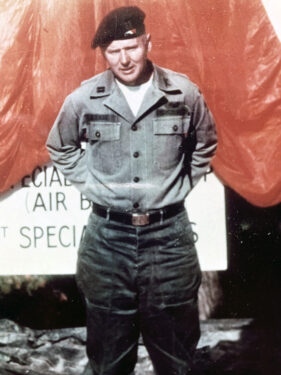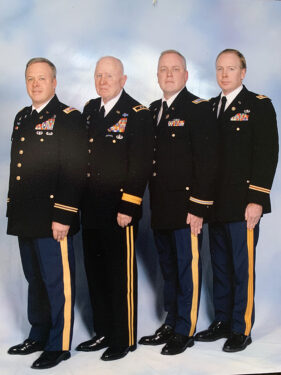
BREEZY POINT — Retired Major Gen. Herbert Ryan, who died June 17 at age 90, identified with Civil War hero Ulysses S. Grant — a man who failed at farming but achieved greatness as a military leader and U.S. president.
For example, as a new civilian lawyer, Gen. Ryan’s brief foray into private practice brought little profit.
“I just think he had trouble when it came time to charge his clients,” said his eldest son, Stephen. “He was very much like one of his heroes, General Grant, who wasn’t cut out for business. He kind of failed at everything he did until he became the Union Army’s commanding general.”
Instead of private practice, Gen. Ryan, who was raised in Floral Park, Queens, used his law degree from St. John’s University to become a legal counsel for various New York City administrative offices.
Gen. Ryan, a resident of Breezy Point, served as deputy commissioner of the Department of Licenses and the Department of Consumer Affairs.
He also worked as general counsel of the Department of Traffic and, in 1975, he was appointed first deputy city clerk. He retired from that job in 1987.
Meanwhile, he held various commands for the U.S. Army Reserve and the New York National Guard before finally retiring as a major general for the New York State Guard in 2003.
Earlier during the Korean War, he battled waves of Chinese shock troops, similar to the scenes depicted in the movie “Pork Chop Hill,” Stephen said.
After the war, he received an officer’s commission in the reserves and became “airborne” qualified. He also earned the right to wear the green beret of the Special Forces.
Stephen and his younger brothers, David and Andrew, followed their father into military service, and all three sons deployed as reserve Army officers in Afghanistan or Iraq. The family’s oldest child, Nancy, is a nurse practitioner.
The Ryan children drew inspiration from their father’s simultaneous commitment to military service, his legal career, his service as a part-time instructor at St. John’s, his family, and his Catholic faith.
“My father wore many hats,” Stephen said. “It depended on what job he had that day, whether he was a soldier, an attorney, a college professor — he was suited for all of them.”
Ryan family members have served in the U.S. military as far back as the Civil War.

Thomas Ryan, an immigrant, became a corporal in the famed “Irish Brigade” from New York City. He fought in major battles, including the First Battle of Bull Run and Fredericksburg.
The corporal’s grandson — Gen. Ryan’s grandfather, Bill Ryan — served in World Wars I and II, first as a doughboy with the “Fighting 69th” in France and later with a field artillery unit on the island of Saipan in the South Pacific.
Through each generation, the Ryans relied on their Catholic faith to carry them through combat and bring them home.
Gen. Ryan, who had spent his life attending Mass each morning, developed a new habit while his boys were at war. After each service, he’d walk home through the streets of Breezy Point, and wherever he encountered an image of the Blessed Mother, he’d stop to say a decade of the rosary.
“Even if it was in front of someone’s house,” Stephen said, “he’d be doing it for us, each of us, when we were deployed.”
Father Bryan Carney, a chaplain at Flushing Hospital Medical Center, is a lieutenant colonel chaplain for the Veteran Corps of Artillery. He is a longtime friend of the Ryan family and was a concelebrant of the general’s funeral Mass on June 20 at St. Thomas More Church in Rockaway Point.
“I was so honored,” Father Carney said. “I was privileged to know him, and the world is still blessed by his presence through the legacy of his sons and the entire Ryan family.”
Stephen, a detective for Nassau County Police, is also a colonel in the New York Guard. David, a clerk for a New York State appeals court, is a lieutenant colonel for the Guard.
Andrew, who lives in Virginia, is a foreign service officer who retired as a major in the Army Reserves.
“Everyone assumes that because the three boys all followed in their father’s footsteps that somehow he made it mandatory, but he never did,” Stephen said. “He let us still be ourselves.
“We loved and admired him so much that we wanted to be just like him.”
